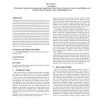Free Online Productivity Tools
i2Speak
i2Symbol
i2OCR
iTex2Img
iWeb2Print
iWeb2Shot
i2Type
iPdf2Split
iPdf2Merge
i2Bopomofo
i2Arabic
i2Style
i2Image
i2PDF
iLatex2Rtf
Sci2ools
111
click to vote
ATAL
2010
Springer
2010
Springer
Decision making with dynamically arriving information
Decision making is the ability to decide on the best alternative among a set of candidates based on their value. In many real-world domains the value depends on events that occur dynamically, so that the decision is based on dynamically changing uncertain information. When there is a cost to waiting for more information, the question is when to make the decision. Do you stop and make the best decision you can, given the information you have so far, or do you wait until more information arrives so you can make a better decision? We propose a model that characterizes the influence of dynamic information on the utility of the decision. Based on this model, we present an optimal algorithm that guarantees the best time to stop. Unfortunately, its complexity is exponential in the number of candidates. We present an alternative framework in which the different candidates are solved separately. We formally analyze the alternative framework, and show how it leads to a range of specific heurist...
Related Content
| Added | 08 Nov 2010 |
| Updated | 08 Nov 2010 |
| Type | Conference |
| Year | 2010 |
| Where | ATAL |
| Authors | Meir Kalech, Avi Pfeffer |
Comments (0)

